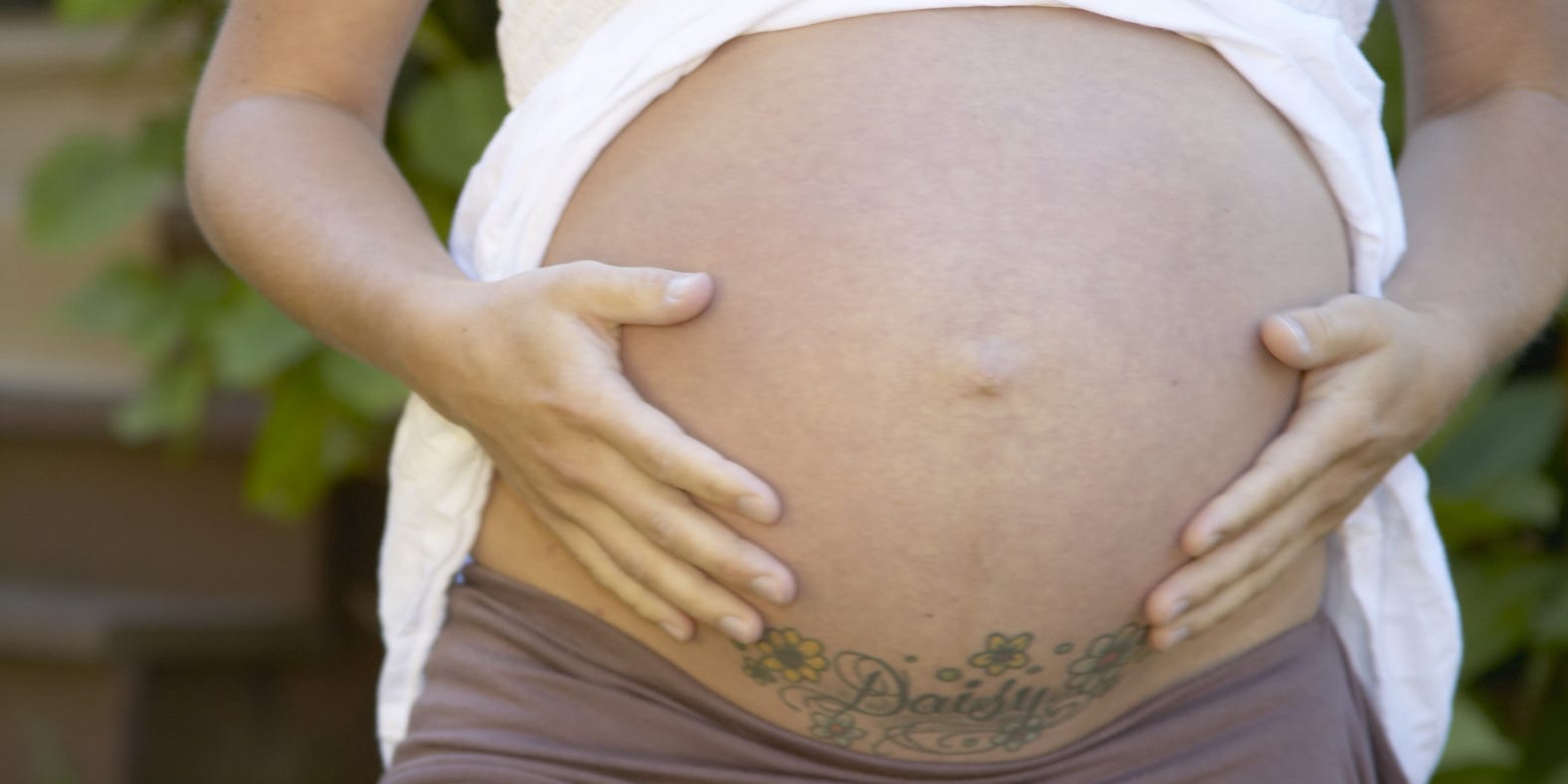
Jules Frazier Photography/Getty Images
- While you can get a tattoo while pregnant, there are some safety risks.
- Safety risks of getting a tattoo while pregnant include infection, disease, and skin irritation.
- To get a tattoo safely when pregnant, go to a licensed artist and ask about their cleaning policies.
- Visit Insider's Health Reference library for more advice.
Tattoos are becoming increasingly common. In fact, about 3 in 10 people report having at least some kind of ink. But tattoos aren't safe for everyone.
If you are thinking about getting a tattoo while pregnant, there are ways to get it done safely but also risks to consider. In general, medical experts do not recommend it and some parlors prohibit inking pregnant people.
Can you get a tattoo while pregnant?
The American College of Obstetrics and Gynecologists (ACOG) has not taken an official stance on whether or not getting a tattoo while pregnant is safe. But in general, it isn't a good idea, says Kim Langdon, MD, an OBGYN with Medzino, an online doctor and pharmacy service.
Whether you're in your first or third trimester, the risks of getting a tattoo while pregnant are the same and include the following:
- Infection. Anytime you get stuck with a needle there is a risk of infection. About 0.5% to 6% of people experience an infection after getting a tattoo, and this risk is even greater during pregnancy due to a suppressed immune system, Langdon says.
- Disease. Diseases like hepatitis B and C, and HIV, can be passed through a tattoo needle and onto the fetus, says Veronica Alvarez-Galiana, MD, the medical director of OB-GYN Services at Community Health of South Florida, Inc. However, disease transmission associated with tattooing remains low in the US.
- Skin irritation. During pregnancy, your hormones are elevated, which makes you more susceptible to skin irritation. So if you get a tattoo while pregnant, you'll likely experience more pain and itching than you otherwise would.
- Contamination. Tattoo ink is not regulated by the US Food and Drug Administration (FDA) because it is considered a cosmetic product. In rare cases, the ink has been contaminated with bacteria that led to infections. Bacterial infections are especially risky for pregnant people as it also poses a risk of infection to the fetus, Langdon says.
- Skin changes. During pregnancy, the skin on your abdomen, breasts, thighs, and upper arms will stretch, which, depending on where you get a tattoo, can affect the design, even after you've delivered your baby. "A fish can end up looking like a whale," Langdon says.
How to safely get a tattoo while pregnant
If you do decide to get a tattoo during pregnancy, here are some ways to make the procedure as safe as possible:
- Go to a professional parlor. While tattoo ink is not regulated by the FDA, tattoo parlors are typically regulated by state and/or local jurisdictions. Therefore, they should be clean and safe. Most states require a license for tattoo artists, so check with your state's department of health or board of cosmetology. "There are folks out there tattooing who lack this experience and professionalism and are experimenting and if you are pregnant, you really want to avoid allowing them to tattoo you," Alvarez says.
- Ask about safety and cleaning procedures. Even with a licensed facility and artist, you should ask specific questions about their tattooing methods and how they clean their tools. Does the artist use new needles and dyes for every client? Do they use a machine that sterilizes equipment?
- Consider the tattoo placement. Keep in mind your skin may change during pregnancy and your tattoo may not look the same once you've delivered your baby. And if you're planning to get an epidural during labor, you might want to avoid getting a tattoo on your lower back. A 2010 review suggests that placing an epidural needle through a tattoo could cause the dye to transfer to the spinal canal. However, doctors are not yet sure what kind of effect this could have on your health.
- Disclose your pregnancy. Even if you aren't showing yet, tell the tattoo artist you are pregnant, so they can double-check all tools have been cleaned properly and they are taking as many safety precautions as possible. Some tattoo parlors even have policies that prohibit their artists from tattooing on pregnant people, Alvarez says.
- Take proper care of the tattoo. Taking care of your tattoo can help decrease the risk of infection. Keep the area clean and avoid sun exposure and soaking in the water while your tattoo is healing. If you notice signs of infection, like redness or swelling, contact your healthcare provider.
Insider's takeaway
There are not many studies on the effects of getting a tattoo while pregnant or breastfeeding, but the procedure does come with risks.
Therefore, you may be better off avoiding it until you are no longer pregnant or breastfeeding. If you do decide to get a tattoo while pregnant, check to make sure the artist you are using is licensed and the parlor is following cleaning and safety protocols.
